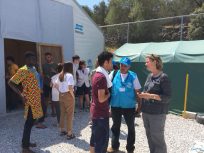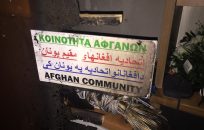UNHCR study shows rapid deterioration in living conditions of Syrian refugees in Jordan
UN High Commissioner for Refugees António Guterres says large numbers of Syrian refugees are sliding into abject poverty, and at an alarming rate, due to the magnitude of the crisis and insufficient support from the international community.
He made the statement at the launch of a new UNHCR study, Living in the Shadows, which reveals evidence of a deepening humanitarian crisis. High Commissioner Guterres is on a two-day visit to Jordan, where he will meet refugees profiled in the study in Amman and others at the Za’atari refugee camp.
“I am here to express my solidarity with Syrian refugees, as the impact of snowstorm Huda is still tangible and posing an even greater strain on their already dire living conditions.” Guterres is also meeting with Jordanian officials and with donors to coordinate efforts to improve living conditions for Syrian refugees and support the communities hosting them.
Conducted by UNHCR and International Relief and Development (IRD) the study is based on data from home visits with almost 150,000 Syrian refugees living outside of camps in Jordan in 2014.
According to the study, two-thirds of refugees across Jordan are now living below the national poverty line, and one in six Syrian refugee households is in abject poverty, with less than $40 per person per month to make ends meet.
Almost half of the households researchers visited had no heating, a quarter had unreliable electricity, and 20 per cent had no functioning toilet. Rental costs accounted for more than half of household expenditures, and refugee families were increasingly being forced to share accommodations with others to reduce costs.
“Unless the international community increases its support to refugees, families will opt for ever more drastic coping strategies,” Guterres said. “More children will drop out of school to work and more women will be at risk of exploitation, including survival sex.”
As the Syrian conflict approaches its fifth year, many refugees are becoming increasingly dependent on assistance. Jordan’s resources and infrastructure, too, have been stretched to the limit.
In an effort to address this critical situation, UNHCR is providing monthly cash assistance to 21,000 of the most vulnerable Syrian families, or 14 per cent of the Syrian refugee population living outside camps. As of the end of 2014, over 10,000 additional Syrian refugee households have been identified as eligible for such assistance but, due to lack of funds, cannot be provided with support.
Overall, the report’s findings make it clear that any further reductions in the current levels of support will have immediate and serious consequences for Syrian refugees in Jordan. The situation is particularly worrying for the most vulnerable populations, such as female-headed households and elderly refugees.
Guterres emphasized that this crisis can be mitigated if the international community steps up efforts to alleviate the suffering of the refugees. He praised the efforts of the Jordanian authorities, UNHCR and its partners to address the urgent needs of refugees during last week’s heavy snowstorm.
In total, Jordan has a registered Syrian refugee population of 620,000, some 84 per cent of whom live outside camps.
“This represents a dramatic pressure in the economy and the society of the country not to mention the terrible security impact of the Syria crisis in itself,” Guterres said.
“The generosity of the Jordanian people and the Government needs to be matched by massive support from the international community – support for the refugees themselves and for the local populations hosting them, but also structural and budgetary support to the Jordanian Government for education, health, water and sanitation and electricity to enable it to cope with this enormous challenge.”
Additional Information:
– The “Living in the Shadows” report is available on our media page at: http://unhcr.org/jordan2014urbanreport/.
Page 16 of 26
-

Cash assistance to hundreds of refugees disrupted by ongoing blockade
20 Aug 2018UNHCR, the UN Refugee Agency, is concerned that cash assistance to hundreds of asylum seekers and refugees has been disrupted since 6 August by an ongoing blockade of its Athens help-desk and cash centre. Demonstrators have occupied the Akominatou Street cash assistance centre, run by UNHCR partner Catholic Relief Services (CRS), […]
-

UNHCR alarmed at shooting incident which left Syrian boy hospitalized
11 Jul 2018UNHCR, the UN Refugee Agency, is alarmed at reports that a 16-year-old Syrian boy was hospitalized with leg and head injuries on the Greek island of Lesvos yesterday, after being shot by a local farmer near the Moria Reception and Identification Centre. “UNHCR unequivocally condemns acts of violence against boys, […]
-

Top UNHCR Official urges action to tackle overcrowding on Greek islands
28 Jun 2018UN Deputy High Commissioner for Refugees Kelly T. Clements, wrapping up a four-day visit to Greece, called for stepped up measures to ease overcrowding and improve security in tense reception centres for refugees and migrants on the Aegean islands. Her call for improvements came after seeing the harsh conditions in […]
-

World Refugee Day: Empowerment and solidarity through arts and culture
14 Jun 2018On the occasion of World Refugee Day, we have the pleasure to invite you to a cultural and participatory celebration together with refugees. The event will take place on Wednesday, 20 June, at 7.30 pm, in Technopolis City of Athens (venue: Purifier, D10). Artistic workshops, painting exhibitions, film screenings, sports, […]
-

Athens restaurants invite refugee chefs into their kitchens for another year for the Refugee Food Festival
12 Jun 2018 -

UNHCR saddened at death of refugees in Greece highway crash
8 Jun 2018UNHCR, the UN Refugee Agency, mourns the death of six people in a highway accident in northern Greece earlier today, including refugees from the Middle East. Police said three children and the driver of the vehicle were among the dead. A further 10 people were injured, three of them seriously, and taken […]
-

“We live Together” – Results of the National Student Contest on refugees
22 May 2018UNHCR, the UN Refugee Agency, in Greece in cooperation with the Youth Awareness Committee[1], is pleased to announce the results of “We live Together”, the 21st National Student Contest on refugees, organized for the school year 2017-2018. The 21st National Student Contest called on students across Greece to share ideas […]
-

Racist Violence Reporting Network: Annual Report 2017
28 Mar 2018 -

Incidents of racist violence in Greece: Comparative presentation of data by the Civil Society and the Hellenic Police
24 Mar 2018 -

UNHCR condemns attack on Afghan community centre in Athens
23 Mar 2018
